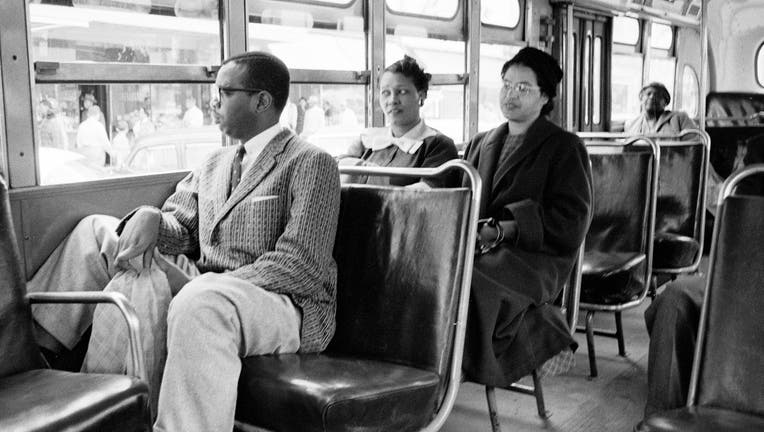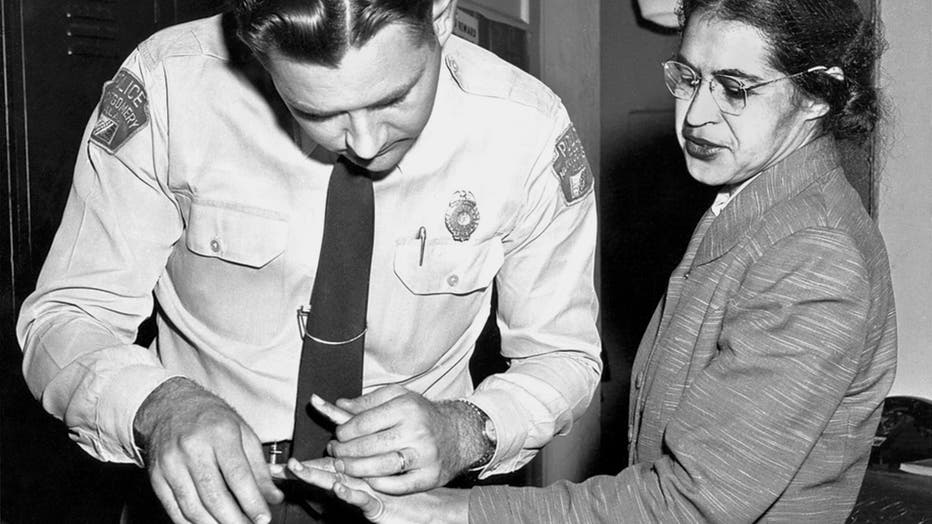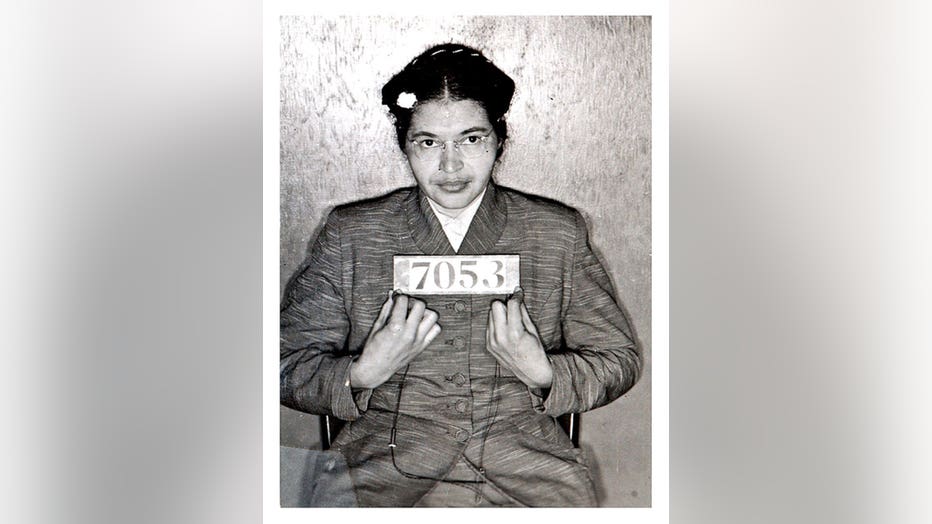Celebrating Rosa Parks' 111th birthday: Atlanta woman recalls being on the bus

American Civil Rights activist Rosa Parks (center, in dark coat and hat) rides a bus at the end of the Montgomery bus boycott, Montgomery, Alabama, December 26, 1956. (Photo by Don Cravens/Getty Images)
ATLANTA - Rosa Park, whose simple act of defiance became a pivotal moment in the Civil Rights Movement, would be turning 111 on Sunday.
The courage of Parks, often referred to as "the first lady of civil rights" and "the mother of the freedom movement," sparked the Montgomery Bus Boycott in 1955. Parks' refusal to give up her seat in the "colored section" to a white passenger on a Montgomery bus on Dec. 1, 1955, after the white section was filled, stands as a monumental act of resistance against racial segregation.
Many came together this weekend in Atlanta to honor her life and keep her spirit alive.

Push for federal holiday to honor Rosa Parks
A unique proposal could lead to a new federal holiday honoring the life of civil rights icon Rosa Parks.
Who is Rosa Park?
Born on Feb. 4, 1913, in Tuskegee, Alabama, Rosa Louise McCauley grew up in an era of severe racial segregation and discrimination in the South. She married Raymond Parks, an active member of the National Association for the Advancement of Colored People (NAACP), in 1932. Rosa herself served as a secretary and youth leader for the Montgomery chapter of the NAACP. Her arrest for violating Montgomery's bus segregation laws was not the first challenge to racial segregation on city buses, but it became the most famous.
Parks' arrest ignited a 381-day boycott of the Montgomery bus system, led by a young Dr. Martin Luther King Jr., is often credited with giving rise to the modern civil rights movement. The boycott led to a November 1956 Supreme Court ruling that segregation on public buses was unconstitutional, a significant victory for civil rights activists.
Beyond her pivotal role in the bus boycott, Parks was an advocate for racial justice throughout her life, working alongside other civil rights leaders and participating in marches and demonstrations. After moving to Detroit, Michigan, she continued her activism, focusing on issues like housing discrimination, education, and the broader struggle for equality.

American civil rights activist, Rosa Parks is fingerprinted by Lieutenant DH Lackey in Montgomery, Alabama, after she was arrested during the Montgomery bus boycott, 22nd February 1956. The boycott was originally sparked by Parks’ earlier arrest on 1
Rosa Parks received numerous awards and honors for her contributions to civil rights, including the Presidential Medal of Freedom and the Congressional Gold Medal. Despite facing personal and financial challenges, Parks remained committed to the cause of justice until her death on Oct. 24, 2005, at the age of 92.
A celebration of Rosa Parks took place at St. Paul AME Church located along Pryor Road SW in Atlanta on Saturday.
A panel of friends, family, and witnesses to Rosa Parks' story she made were on hand.
"She didn’t wake up that morning deciding, ‘Oh, this is going to be,’" one speaker told the crowd.
"It was something in her spirit that said, ‘Don’t’ give up’" the speaker added.
Atlanta woman was on the bus with Rosa Parks
"It’s just another day in my life," said Loretta Jane Gunter.
Gunter was born and raised in Atlanta. She said growing up, she never felt like a white person; she was just "a person."
"See, I didn’t understand the word ‘racial’," Gunter explained, adding she grew up in a mostly integrated neighborhood and never felt any tension.
"My mother always said that if she made cookies or a pot of soup, everyone was welcome to the table," she added.
It wasn’t until Gunter moved to Montgomery that she began to see the hatred in the world.
Rosa Parks and the ‘Baby on the Bus’
On Dec. 1, 1955, Gunter, who was pregnant and in her final trimester, decided to take Montgomery City bus number 2857.
"I got on the bus because I had walked to town every day from the base, I was great with child," she said.

Loretta Jane Gunter was aboard the same bus which Rosa Parks refused to surrender her seat in Montgomery, Alabama in 1955. (FOX 5)
She explained how she used to keep a bin in her shoe in case she needed it.
"I had never ridden it until that day," she said.
Gunter sat behind the bus driver and made some small talk, but was mostly keeping to herself.
"I was sitting there in my world," she said.
It was a commotion that pulled her from that world.
"All of the sudden the driver jumped up and said something ugly to somebody down the aisle," she said. "I was an inner-city kid from Atlanta and manners were used all the time. When he yelled out, ‘You better let me have that seat,’ I said, ‘Oh, she can have my seat.’
Gunter quickly jumped up, but was forced back into her seat.
"A fair-skinned, tall, light-haired man pushed his knees into mine and under his breath said, ‘Don’t you dare move,’" Gunter recalled.
"And of course, I didn’t. I sat down because in those days, for those of you who don’t know those days, women did what men said, I don’t care who you were. White women did what men said," she added.

Rosa Parks mugshot in 1955. (Photo courtesy Bureau of Prisons/Getty Images)
At the time, Gunter didn't know who was being yelled at, what color they were, or what it was all about. What she did know was that it was a lady being talked to rudely.
Gunter was eventually told to get off the bus, along with all the other passengers. She had left the area before the police arrived to arrest Parks. She would find the base had been placed on lockdown but didn’t immediately know why.
She also didn’t get to follow the bus boycott which followed as her baby was born shortly after.
Rosa Parks meets Jane Gunter
Gunter had not told anyone about the incident until 35 years later, when her son was looking through a Life magazine and commenting on the bus.
It was then that her family encouraged her to reach out to Parks. The two eventually met and swapped stories. They became fast friends.
"It was wonderful to be able to share that story," Gunter said.
She says she still doesn't see race, just as she had on that bus more than 68 years ago.
"And that’s the way my life is," she said.
Gunter is working with a group that wants to make Rosa Park's birthday a national holiday.

